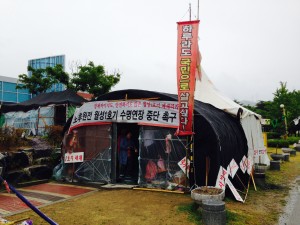As the faculty member responsible for addressing leadership development and study for Bard’s MBA in Sustainability I am especially interested in the crosscultural and intergenerational implications of climate change and sustainable economic development in leadership practice. The conference and site visits hosted by Yonsei University and KFEM provided me with a unique opportunity to understand Korea’s leadership response to these challenges and to meet personally with leaders at many levels including government, industry, academia, grassroot community organizations as well as the affected local populations.
The diversity of perspectives provided us with a comprehensive analysis of how Korean leadership is responding and developing solutions to these complex issues. The ability to meet and discuss the different responses from various levels of Korean society provided a multidisciplinary perspective of the crosscultural similarities and contrasts between North American and East Asian response to climate change and sustainable development. It also brought into greater perspective the global dimension of the problems leaders are all facing in addressing these challenges.
The site visits were especially effective in illustrating how local leaders are facing challenges in addressing the conflicting goals of reducing carbon emissions on a national and global level while respecting the environmental impact on local communities. In addition, the conflicting goals of national and local industry were also illustrated on many levels.
There are many lessons learned from Korean leaders that can be applied to leadership development in North America. The experiences from the trip will provide many applications for bringing these issues to life in a classroom setting at Bard. I have captured some examples of classroom applications below.
Applications
Example One: Prof. SoonIl AN, Department of Atmospheric Sciences, Yonsei University
The presentation confirmed evidence of global agreement on climate change through data collected in South Korea.
Application: The importance of collaborating and sharing data between global leaders in the scientific community to build a stronger case for the combined impact of climate change.
Example Two: Esook Yoon, Professor, Department of International Studies, Kwangwoon University, Transborder Pollution issues in East Asia & Joonhong PARK, Professor, School of Civil and Environmental Engineering, Yonsei University, Climate Change and Environmental Microbial Risk
Professors Yoon and Park provided evidence to show that climate change in Mongolia and Central China was not only creating environmental damage and risk to human health in China but that this impact had transborder implications for the Korean peninsula.
Application: Leaders face unique public health challenges when collaboration on climate change is not possible or restricted because of politics or national borders. This illustrates the importance of global cooperation on climate change and public health issues. (The MERS outbreak in Korea at the time added a unique perspective to the transborder public health issue.)
Example Three: Tae Yong JUNG, Professor, Graduate School of International Studies, Yonsei University Climate Policy in Korea and Emission Trading System
Prof Jung discussed the Korean government’s policies on emissions trading and its strategy for addressing environmental issues while maintaining economic development. Applications: While not a perfect formula, Korean leaders are struggling to develop innovative strategies that marry economic development with environmental concerns. Our site visit to Garorim Bay and the Wulsung Nuclear Facility provided evidence however of the inherent conflicts that exist when strategies designed with national and global carbon emission targets impact local ecosystems and economies. This provides the basis for an excellent case study in the conflicting goals of global, national and local leadership in sustainability.
Example Four: Taedong Lee, Professor, Department of Political Science and International Studies, Yonsei University, Global Warming and Global Cities
Prof. Lee illustrated how leadership at the city government level can leverage their command of popular support and local policy to set an example for other communities nationally and globally.
Applications: Effective and innovative local leadership can transcend geographic limitations to impact strategy and policy on a broader national and local level.
Example Five: Site Visits:
- ● Dangjin Power Plant. Director, Jong Jun, Yu, and Managers Kwon Taek, Im, and Sang Su, Jo
- ● Garorim Bay, West coast KFEM staff and Pul Puri Yundea and community members.
- ● Wulsung Nuclear Facility. President of Kyong Ju KFEM, Sang Hong, Lee and community members.
These site visits provided a unique opportunity to examine the intergenerational aspect of leadership at play and the differences that exist between age groups in both the goals and impact of policy. Through our meetings we personally witnessed the impact of economic development on different generations. Korean society presents a unique challenge for sustainability as the younger generation is increasingly urbanized and therefore further removed from the traditional way of life. This has left their parents’ generation to bare the brunt of the impact of growth on local environments and industries while assuming local leadership in the struggle for more effective policies. This widening gap represents a unique challenge for Korea as grassroot leaders sunset. This raises the question of who will defend local ecosystems and their economies when these graying leaders have died. These site visits serve as a basis for an excellent case study in intergenerational leadership. This is a topic that is extremely relevant in American society as the baby boomer generation sunsets.

